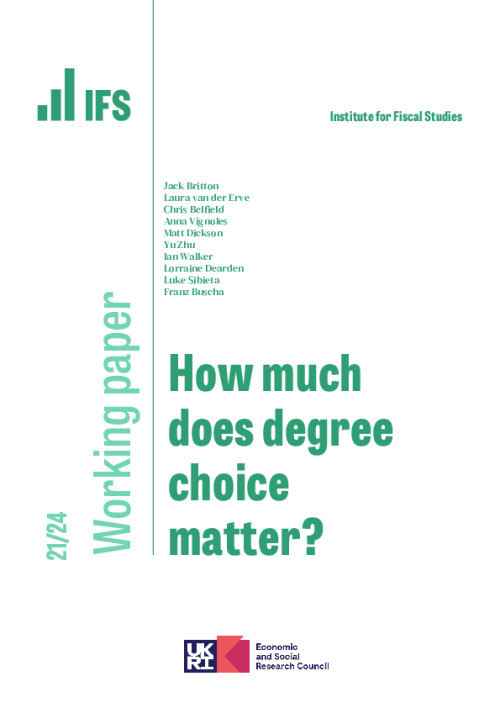Downloads

WP202124-How-much-does-degree-choice-matter.pdf
PDF | 5.79 MB
Appendix
XLS | 626 KB
Using a large and novel administrative dataset, this paper investigates variation in returns to different higher education ‘degrees’ (subject-institution combinations) in the United Kingdom. Conditioning on a rich set background characteristics, it finds substantial variation in returns, even within subject, across universities with very similar selectivity levels, suggesting degree choices matter a lot for later-life earnings. Selectivity is weakly related to returns through most of the distribution but strongly positively correlated at the top end. Other than selectivity, returns are poorly correlated with observable degree characteristics, which has implications for student choices and the incentives of universities.
Authors

Lorraine Dearden

Ian Walker

Research Fellow
Luke is a Research Fellow at the IFS and his general research interests include education policy, political economy and poverty and inequality.

Anna Vignoles

Associate Director
Jack's main interests lie in human capital accumulation and discrete choice dynamic modelling.

Chris Belfield

Yu Zhu

Matt Dickson

Laura van der Erve

Franz Buscha
Working Paper details
- DOI
- 10.1920/wp.ifs.2021.2421
- Publisher
- Institute for Fiscal Studies
Suggested citation
Belfield, C et al. (2021). How much does degree choice matter?. London: Institute for Fiscal Studies. Available at: https://ifs.org.uk/publications/how-much-does-degree-choice-matter (accessed: 3 May 2024).
More from IFS
Understand this issue

Sure Start achieved its aims, then we threw it away
15 April 2024

If you can’t see it, you can’t be it: role models influence female junior doctors’ choice of medical specialty
24 April 2024

Scottish Budget 2024-25: IFS analysis
Policy analysis

The short- and medium-term impacts of Sure Start on educational outcomes
9 April 2024

Sure Start greatly improved disadvantaged children’s GCSE results
9 April 2024

What you need to know about the new childcare entitlements
28 March 2024
Academic research

Labour market inequality and the changing life cycle profile of male and female wages
15 April 2024

Higher Education Access and Funding: challenges and policy options

Imagine your life at 25: Gender conformity and later-life outcomes
24 April 2024